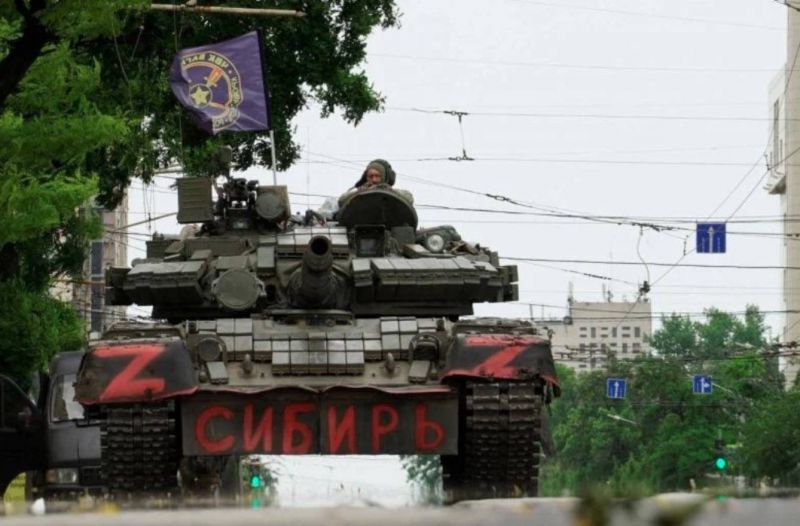
Wagner militia fighters in the city of Rostov-on-Don, June 24, 2023. (Credit: AFP)
The sequence only lasted 24 hours, a brief period that provided ample space for a myriad of opinions to form.
Despite the fact that certain Middle Eastern countries maintain favorable ties with Russia and perhaps even clandestinely with the Wagner paramilitary group, an air of silence appears to have prevailed.
This inhibition can be attributed, in large part, to the apprehension instilled in regional leaders by the recent uprisings.
Indeed, the possibility of a coup d'état orchestrated by Yevgeny Prigozhin, the leader of the Russian-backed militia, has been dismissed. On Saturday evening, Prigozhin publicly declared that he had ordered his troops to halt their advance toward Moscow, merely 24 hours after declaring war on the Kremlin.
Nevertheless, it is undeniable that this rapid escalation garnered significant attention in the Arab world. The presence of Wagner’s mercenaries in numerous countries, ranging from Libya to Syria and Sudan, meant that developments within the group were closely monitored.
Officially, the reaction from heads of state in the region was scarce, if not delayed.
Turkish President Recep Tayyip Erdogan was one of the first to reach out to Russian President Vladimir Putin, extending his “full support” on Saturday afternoon.
As per the Turkish Presidency, Erdogan urged the Kremlin leader to exercise prudence, while emphasizing his readiness to contribute toward a peaceful resolution to the situation.
This response was to be expected from the Turkish head of state, given his efforts to maintain a certain level of neutrality on the Ukrainian matter, owing to strategic cooperation with Russia and a personal rapport with its president. Erdogan has concurrently pursued mediation efforts.
For Recep Tayyip Erdogan, the recent Russian events undoubtedly resonated with the failed putsch of July 2016 in Turkey, an event that had a deep and traumatic impact on the Turkish leader, prompting him to initiate a purge within the country.
Israel also issued a reaction on Saturday, urging its citizens in Russia, numbering around 70,000, to reassess their presence in the country. It is noteworthy that tens of thousands of Russian Jews have already immigrated to Israel following the Kremlin’s invasion of Ukraine.
Embarrassment
Tehran, having expressed its support for Moscow, issued a response on Saturday afternoon through its Foreign Ministry spokesman. In a statement, the spokesperson affirmed that the “Islamic Republic of Iran stands in favor of upholding the rule of law in the Russian Federation.” Subsequently, the Iranian Foreign Minister engaged in discussions with his Russian counterpart, expressing confidence that Russia, a “neighboring and friendly” nation, would successfully navigate through the current events.
Despite occasional divergences in their interests, the conflict in Ukraine has underscored the necessity for cooperation between these two internationally isolated leaders, particularly in the realm of military affairs. Tehran has provided Russia with its Shahed-136 drones, which have been operating in Ukrainian airspace since September.
In the Gulf region, Bahrain announced its vigilance in monitoring the unfolding events and emphasized the significance of upholding stability under the leadership of President Putin.
Qatar reiterated its strong support for the United Nations Charter, adherence to principles of international law and respect for the sovereignty and territorial integrity of states.
The United Arab Emirates, on the other hand, called for de-escalation and the exercise of restraint.
The relatively restrained response from Abu Dhabi can be attributed to embarrassment caused by recent events. Despite strengthening ties with Moscow since the Ukrainian conflict, the UAE also maintains a longstanding relationship with the Wagner paramilitary group.
Similar to Egypt, Abu Dhabi has collaborated with the group to support its Libyan ally, Marshal Khalifa Haftar, whom they view as a counterforce against its adversary, the Muslim Brotherhood.
Confidential information obtained by US intelligence services which leaked last spring revealed suspicions of the UAE's involvement in financing operations conducted by the Wagner group, particularly in Libya. Additionally, the Financial Action Task Force (FATF), an international body responsible for monitoring money laundering and the financing of terrorism, placed the UAE on its gray list in March 2022.
Airstrikes
While Saudi Arabia has not issued an official response to the recent events, opinion pieces in the press have actively addressed the subject.
One editorial in the Saudi daily al-Shark al-Awsat argued that a militia cannot think and act in the same manner as a state, suggesting that Russia’s misstep may have been in bringing back the Wagner forces to Russia after their previous deployment in Syria, Libya and other parts of Africa to serve Moscow’s military objectives.
The editorial further highlighted that the citizens of conflict-torn Middle Eastern nations are well aware of how these “militias” can turn against the state and the people, often exploiting national, sectarian, and religious pretexts.
Despite the war in Ukraine, Saudi Arabia has maintained robust ties with Russia, and the two countries closely cooperate on oil-related matters as part of the OPEC+ alliance.
In a noteworthy development, Saudi Arabia re-established diplomatic relations with the Syrian regime led by Bashar al-Assad, which is supported by Moscow. This move marked a significant shift after more than a decade-long hiatus and indicated Assad’s return to the Arab fold.
On social media platforms, numerous Syrians expressed their satisfaction at the perceived threat Moscow was facing.
One Syrian pro-revolution activist tweeted, “Wagner and Putin are two sides of the same coin, war criminals. They have ravaged Syria and caused the deaths of thousands of innocent people, just as they have done in Ukraine. Continue your war, and we are extremely pleased.”
Others were quick to highlight Russia’s airstrikes on Sunday in Syria’s Idlib province, the remaining rebel stronghold in the country’s northwest, which resulted in the deaths of at least 13 individuals, including several children.
“Russia is currently facing internal turmoil, yet it still finds the time to drop bombs on Syrians,” remarked one social media user on Sunday.
This article was originally published in French in L'Orient-Le Jour. Translation by Sahar Ghoussoub.